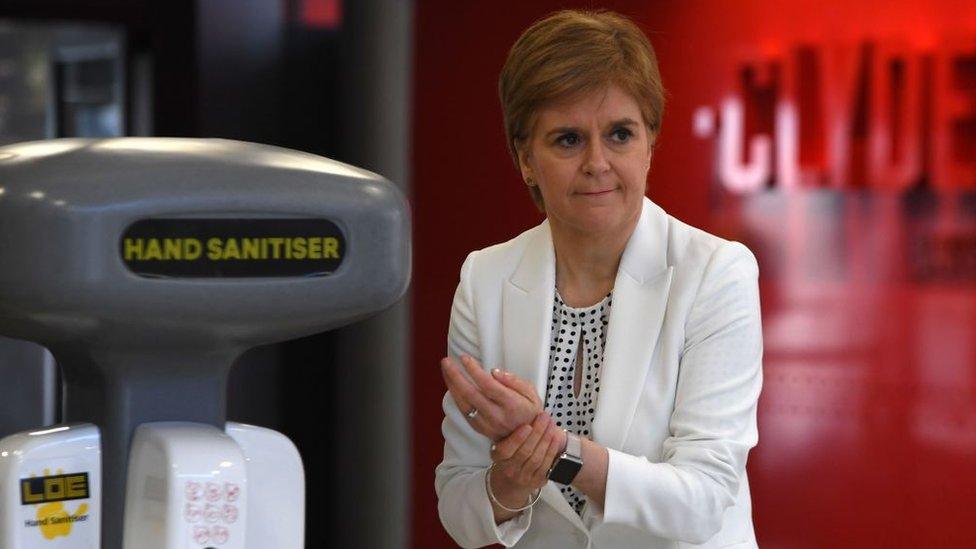Coronavirus: Views reflect underlying attitudes to governments
- Published

The difference in how well the UK and Scottish governments are thought to have handled the coronavirus crisis is remarkable.
After all, they have both faced very similar criticisms, including too little PPE, too little testing and too little care and attention to the needs of care homes.
Yet according to Ipsos Mori's research for BBC Scotland released on Tuesday, 82% of Scots think that Nicola Sturgeon has handled the crisis well, while almost as many (78%) say the same of the Scottish government as a whole.
In contrast, only just over one in three (34%) believe that the UK government has handled matters well, while even fewer say the same of Boris Johnson (30%).
Why the difference?
The survey was undertaken before the row about Dominic Cummings' journey to Durham broke out over the weekend. So the views people expressed about the UK government's handling do not have anything to do with that.
In part, the explanation lies in long standing differences in attitudes towards the two governments.
Ever since the advent of devolution, voters in Scotland have been inclined to evaluate the Scottish government more highly than its counterpart in London, whatever the issue at stake.
The Scottish government benefits from a halo effect whereby credit for what is done well in Scotland is attributed to Holyrood and blame for poor performance is laid at the door of Westminster.
Meanwhile, many voters will be viewing the two governments through a partisan lens. Those who back the SNP will be inclined to think that the Scottish government is doing well, while they will judge the actions of the government in London more harshly.
Those who support the Conservatives will approach the issue from the opposite perspective. But there are, of course, many more SNP than Conservative supporters north of the border.

RISK AT WORK: How exposed is your job?
SCHOOLS: When will children be returning?
THE R NUMBER: What it means and why it matters
A SIMPLE GUIDE: What are the symptoms?

Even so, neither of these considerations can fully account for what is as much as a 52-point difference between the proportion who think Nicola Sturgeon has handled the crisis well and the proportion who thinks Boris Johnson has done so.
It also looks as though the Scottish government is closer to the public mood as to how the lockdown should now be handled.
Overall, it has adopted a more cautious approach to easing the lockdown than the UK government. And over three in four (77%) think that moving too quickly out of lockdown is the bigger risk. Only around one in five (19%) believe that moving too slowly is. Those who think the UK government is handling things badly are especially concerned about the risk of easing up too quickly.
More specifically, the Scottish government has placed less emphasis than the UK government on getting people back to work and reopening schools. That also better matches the public mood.
Slightly more (46%) oppose a return to work by those who cannot work from home than are in favour (42%). This is particularly true of those who think the Scottish government has handled things well.
Similarly, parental concern about sending children back to school is especially high among those who back how Edinburgh has handled matters.
One area where Nicola Sturgeon has promised a relatively early easing of restrictions is being able meet family and friends again, if only outside. This matches the public's priority - over three-quarters (77%) back being able to meet a friend or a family member outside.
It is then, perhaps, unsurprising that voters are much more likely to think the Scottish government's messages about what to do during the crisis have been clear than they are to say the same of the UK government. For they also seem happier with what Nicola Sturgeon is telling them to do.

About this piece
This analysis piece was commissioned by the BBC from an expert working for an outside organisation.
Sir John Curtice, external is professor of politics, Strathclyde University, and senior research fellow at ScotCen Social Research.
